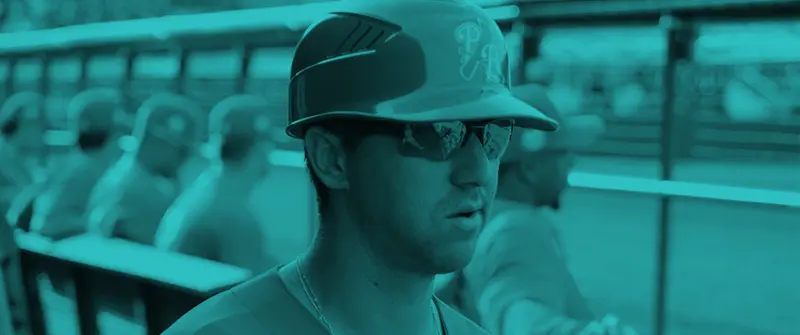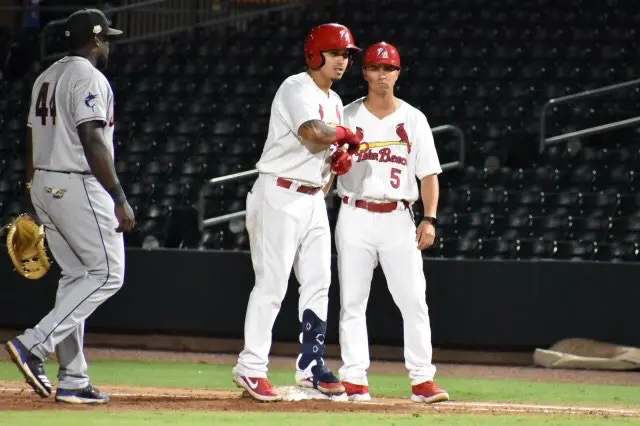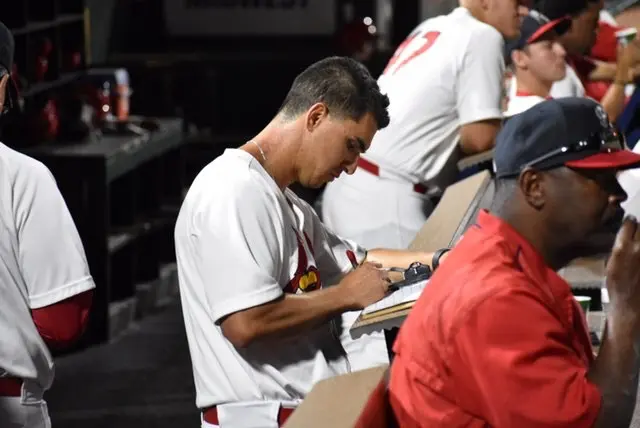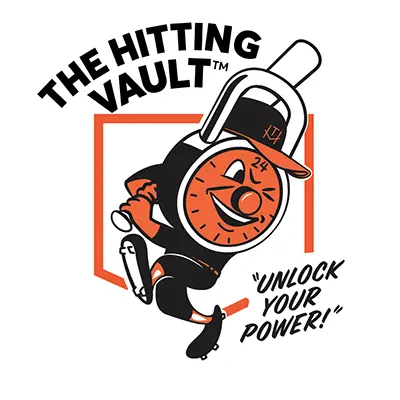Q&A with Tyger Pederson

When left-handed outfielder Stu Pederson was drafted by the Los Angeles Dodgers in the ninth round of the 1981 MLB draft — coming off the board at No. 228 overall out of USC — it marked the beginning of a decade-long professional career that peaked with an eight-game callup in the autumn of 1985, a stint in which he chalked up a -0.1 WAR with one run scored and a single RBI.
Pederson never made it back to The Show. He spent seven more seasons down on the farm, ultimately hanging up his spikes for good in 1992 at the age of 32. Then a father of two little boys, he retired having achieved every Little Leaguer’s dream — if only for a fleeting moment.
But that cup of coffee back in 1985 wouldn’t end up being Stu Pederson’s final contribution to baseball. Two decades later, those little boys — Tyger (the elder) and Joc (the younger) — were also be drafted by the Dodgers.
If you’re reading this, chances are that you already know one half of that story. Joc Pederson (a southpaw outfielder like his dad) is an MLB All-Star who’s proven to be clutch in post season for the last two World Series (Dodgers & Braves).
But Tyger Pederson has also carved out a space for himself in the game, albeit by taking a different path than his little brother. While Joc has established himself as one of the league’s top young sluggers, Tyger has come to be known as one of the sport’s up-and-coming hitting instructors.
After playing one season with the Dodgers’ Arizona Rookie League affiliate, Tyger continued his professional baseball career with numerous independent league organizations. In 2016, with his MLB aspirations as a player dimming, he decided it was time to turn his attention towards coaching.

Tyger coached for Major League Baseball in Taiwan and worked with college clubs before joining the St. Louis Cardinals coaching staff in 2019. Currently, he serves as the hitting coach for the Springfield Cardinals, the parent club’s Class AA in the Texas League North Division.
The Hitting Vault sat down with Tyger to discuss his family’s rich history and success in the game of baseball, as well as his own fascinating journey as both a player and coach.
In the interview, Tyger goes into greater detail about his journey through the game of baseball, why he decided to transition into coaching, discusses his role as a hitting coach with the Springfield Cardinals, and offers advice for young aspiring hitters in the game today.
Interview With Cardinals’ Hitting Instructor Tyger Pederson
The Hitting Vault: Can you give our readers a quick overview of your baseball career, as both a player and coach?
Tyger Pederson: Definitely. I played college ball at the University of Pacific in Stockton, California. I was drafted there in 2013 by the Los Angeles Dodgers. I played with them for two years, and after that I played some independent league baseball. I went out to Rockford, Illinois, in the Frontier League. After that season, I played for the San Rafael Pacifics. I was then traded to the Vallejo Admirals in the same Pacific Association League. I played with them for a couple weeks and was then presented an opportunity to coach with Major League Baseball in Taiwan.
As a 26-year-old playing independent league baseball, versus being a coach and getting my foot in the door and beginning that new career, it was kind of a no-brainer. It came to that point where I knew I wasn’t going to play in the Big League, but I knew I had a higher ceiling in the world of coaching. I’ve known my whole life that I was going to be a coach. My playing days prepared me for this moment and put me in a position to be around a lot of intelligent baseball people.
I was in Taiwan for one summer, but then returned back to the U.S. I then accepted a collegiate job with Hawaii Pacific University as a graduate assistant while pursuing my master’s degree in education. I was there for a season and then managed in the California Collegiate League that summer. In the summer of 2017 with the Orange County Riptide, we won the CCL and I was awarded “Manager of the Year.”
The following season, I coached at Cal Poly San Luis Obispo in the Big West Conference. In the summer of 2018, I managed in the Northwoods Collegiate League with the Duluth Huskies. We went on to win the North Division Championship and reset the franchise record in wins, stolen bases, and produced the most runs scored ever in the history of the Northwoods League.
In 2018 I was presented the opportunity to coach with the St. Louis Cardinals. Jeff Albert, the team’s new hitting coach, reached out during the MLB Winter Meetings and asked if I was interested. They had an opening with their Palm Beach affiliate. I also spoke with Gary LaRocque, the Cardinals’ director of player development, and a few other people in the Cardinals organization, and ultimately got the job.
Since then he has moved up from the Cardinal’s Class A to their AA in Springfield.
THV: What made you ultimately want to get into coaching and serve as a hitting instructor at the professional level?
TP: I come from a lineage of coaches. My grandpa was a coach for a long time and my dad coached my brother Joc and me growing up. Now he coaches in a summer college league as well. I’ve always personally known that I wanted to get into coaching once I stopped playing. It’s the career I’ve always wanted. I’ve always taken a liking to helping others.
Even as a player, I was presented with guys who were looking for help. In rookie ball with the Dodgers, I played with Cody Bellinger and we formed a special bond. To be able to help him as a young 18-year-old high school player when I was an older 23-year-old player was rewarding. Cody took a liking to me and I took him under my wing. I’ve always liked the coaching aspect of the game and I’ve always connected well with guys. They trust my opinion and what I see.
Related reading: Cody Bellinger Swing Analysis
As a player, I’d always seek out the hitting coordinators and individuals who’ve been in the game a long time. With hitting, there’s so many different perspectives. You have a lot of different people who have different kinds of styles. Being able to listen and learn to what they had to say was really big. A couple guys I learned a lot from while I played were Damon Mashore, Jose Vizcaino and Johnny Washington.
Now, being with St. Louis, we have a lot of similar hitting minds like myself. Jeff Albert has done a really good job of bringing me in and taking me under his wing. I’m looking forward to this offseason and continuing to work with him and pick his brain. It’s a constant development of learning what you can about all the different aspects of the game.

THV: What were the behind the scenes moments that ultimately led to your current position with the St. Louis Cardinals?
TP: I know Jeff Albert wanted a young, creative and open-minded individual who would be willing to use technology, data and metrics. It was just a fit. I’m really thankful for this opportunity and Jeff believing in me and my capabilities.
I always had the feeling that the sport of baseball would go in this direction (greater use of growth mindset, analytics, technology, etc.) so I wanted to learn as much as I could.
THV: With your coaching career now seemingly in full gear, what do you believe is the next step in your evolution in this field?
TP: Right now I’m just focused on taking things one step at a time. I’ve been very fortunate and blessed with good opportunities in the game of baseball. I believe that has come from working hard and being prepared for whatever comes next. I just want to do as well as I can. I think being able to prepare hitters and making them better is something I pride myself on. I love watching these guys rise up the system, break into the next level and have success.
I just want to do a good job at the level I’m currently at and try to learn as much as I can from the awesome people in the St. Louis Cardinals organization. I want to continue to do that, have a productive offseason and then be prepared for next year.
THV: In relation to The Hitting Vault and our goal of aiding young hitters across the country, what advice and tips would you present to them as they look to get better?
TP: Learning the swing is the number one most important thing. Being able to get into a good position, get good swings off and have intent at the plate. I think that’s something that gets lost sometimes. Having the intent to do damage each time you hit is something the game of baseball is changing towards.
Coach Lisle does a really good job with this with The Hitting Vault. In a lot of his videos, his core foundation is getting into a good hitting position and having a good swing path. You’re seeing guys who are throwing 95 MPH plus with movement. You’re just seeing a lot of nasty stuff and the game is changing.
For young hitters trying to make their way through the high school and collegiate ranks, that’s something you want to start at an early age. You have to teach yourself to get into a good position now as an amateur player. If you do that, you’re so much ahead of the game.
THV: With your experience in professional baseball staffs and scouting departments, what do you think they’re looking for particularly in prospective hitters?
TP: Offensively, things they look at are a player’s raw power, game power and the hit tool. They can observe these things in both batting practice and in-game action. Also, having a high baseball IQ and a strong work ethic is very important.
As a young hitter, you want to be able to do as much as you can and showcase yourself in the best way possible. At these big high school showcases, there’s a lot of college and professional evaluators watching. Presenting positive body language, good work ethic, high energy and a passion for the game are all things we look for.

The Hitting Vault is the most popular, most trusted and highest rated online hitting community.
It was created to teach athletes how to move their body to unlock their most powerful swing. It’s designed to help coaches get optimal results from their athletes. Join and get access to over 200+ exclusive videos for members and step-by-step instruction so you’ll know exactly what to do next to unlock your power at the plate.


